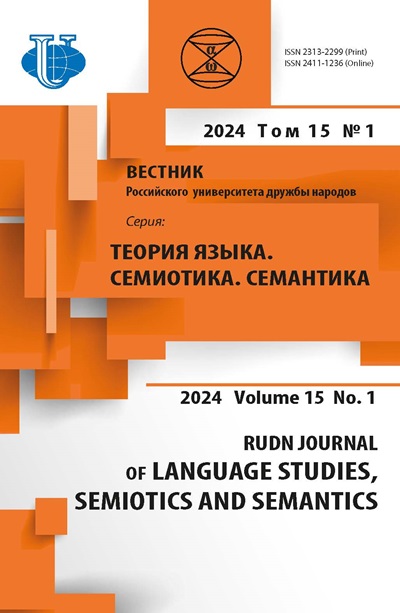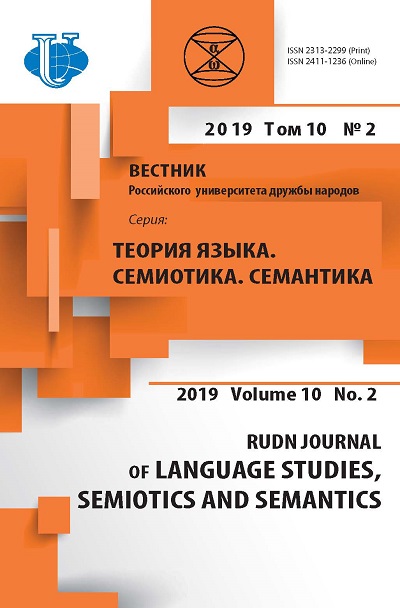RECIPIENT FACTOR IN POETIC TRANSLATION DIACHRONY
- Authors: Filippova I.N.1
-
Affiliations:
- Moscow Region State University
- Issue: Vol 10, No 2 (2019)
- Pages: 435-450
- Section: PRAGMALINGUISTICS
- URL: https://journals.rudn.ru/semiotics-semantics/article/view/21759
- DOI: https://doi.org/10.22363/2313-2299-2019-10-2-435-450
Cite item
Full Text
Abstract
The paper's aim is to analyze transchronical interlingual and intercultural poetic communication. Special attention is paid to the recipient, his significance in diachronic translation is investigated. Linguistic and cultural aspects of poetic communication are analyzed: realities, historicisms, archaisms, phraseological units, allusions. The recipient factor is actively studied in pragmalinguistics, which finds common ground with translation studies and the theory of intercultural communication. The research is based on the integrative method: descriptive, contextual, comparative and discursive analysis are used. The paper reveals the synergetic nature of the recipient, unique on age, gender, worldview, political and cultural characteristics; cognitive dissonance of the author and the recipient in monolingual and in interlanguage communication are revealed. The actual basis is the novel in verse Pushkin “Eugene Onegin”, written almost 200 years ago and numerous translations made at different times (1840-2008). The studied empirical material leads to the following conclusions. The translation multiplicity in transchronical transfer of cultural heritage to foreign languages is natural and unavoidable. The search for adequate means of intercultural translation of poetry is transcendental in nature. The syncretic nature of the poetic sign in diachrony strengthens the discrepancy between the recipient's and the author's conceptual and thematic knowledge content. This is particularly evident in terms of the transf chronic communication when the author and recipient are separated by a significant time interval. The source language recipients and the target language recipients have objective sociocultural differences which are more evident in transtemporal interlingual communication. The above-mentioned factors interact in the complex synergistic system that is impossible to cognize and to describe in a reductive linguistic theory of translation. On the basis of insufficiency of the reductionism of the linguistic translation, can be expected the transition to the methodology of holism translation. Holism as a methodological principle and philosophy of knowledge has found effective application in the Humanities. Its use in translation in cross-cultural, cross-language and TRANS chronic communication appear to be objectively necessary. The need for pragmatic adaptation and the borders of its approximate values is to be verified in further studies, combining pragmalinguistics, cognitive linguistics, translation studies, functional stylistics, discourse analysis and linguocognitive translation.
About the authors
Irina Nikolaevna Filippova
Moscow Region State University
Author for correspondence.
Email: inf.perevod@gmail.com
Doctor of Philology, assistant professor at the Department of Translation Studies and Cognitive Linguistics, Moscow Region State University
24, Very Voloshinoy Str., Mytishchi, Russia, 141014References
- Kushnina, L.V. & Silantieva, M.S. (2010). Translator’s linguistic identity in light of theory of translation space. Perm University Herald. Russian and foreign Philology, 6(12), 71—75. (In Russ.).
- Ershova, E.A., Muzychenko, E.Ya. & Chaykovsky, R.R. (2011). Literary translation and crosslanguage diversification of meaning. Bulletin of the North-Eastern State University, 15, 8—10. (In Russ.).
- Yartsev, Yu. A. (2010). Art and practice of translation. Different vision when translating technical texts from Russian into English. Diversification of translation techniques. Saint Petersburg: ID “Petropolis”. (In Russ.).
- Belozerova, N.N. (2010). The real world and the virtual world: two ecological systems? Tyumen. (In Russ.).
- Sternin, I.A. (2004). Adresse's Factor in Speech Influence. Proceedings of Voronezh State University. Series: Philology. Journalism, 1, 171—178. (In Russ.).
- Lysenkova, E.L. & Tchaikovsky, R.R. (2012). Literary translation in the context of space and time. Vestnik of Irkutsk State Linguistic University, 2 (18), 147—156. (In Russ.).
- Maksimenko, O.I. (2014). Multicultural Environment: the Complexity of Understanding. In Language and Culture in Modern World. Moscow. pp. 131—135 (In Russ.).
- Nelyubin, L.L. & Khukhuni, G.T. (2006). Translation Science (History and Theory from Ancient Times to the Present Day). Moscow: Flinta: Science.
- Sidorov, E.V. (2009). Advance Understanding in Cross-cultural Communication. Vestnik of Nizhny Novgorod Linguistic University, 4, 190—195. (In Russ.).
- Khukhuni, G.T. & Osipova, A.A. (2012). The “Renovations” of the Translations of the Hole Writ: Motives and Consequences. Bulletin of the Moscow State Regional University, 4, 51—54. (In Russ.).
- Pushkin, A.S. (1986). Works: in 3 vols. V. 2: Poems; Eugene Onegin; Dramatic works. Moscow: Khudozhestvennaya Literatura. (In Russ.).
- Minyar-Beloruchev, R.K. (1999). How to become a translator? Moscow: Gothic. (In Russ.).
- Abramova, E.I. & Oschepkovа, V.V. (2013). Peculiarities of Functioning of Celticism which Caracterize Objects of Natural in English. Bulletin of the Moscow State Regional University: Linguistics, 6, 52—56. (In Russ.).
- Sidorov, E.V. & Sidorova, N.A. (2009). Basic structure of axiological measurement of speech communication. Vestnik of Nizhny Novgorod Linguistic University, 6, 166—172. (In Russ.).
- Schweitzer, A.D. (1973). Translation and linguistics. Moscow: Voenizdat. (In Russ.).
- Nelyubin, L.L. (2003). Explanatory dictionary of translatoloy. Moscow: Flinta: Science. (In Russ.).
- Bakhtin, M.M. (1979). Aesthetics of verbal creativity. Moscow: Art. (In Russ.).
- Chaykovskiy, R.R. (1997). Reality of poetic translation (typological and sociological aspects. Magadan. (In Russ.).
- Akhmanova, O.S. & Gyubbenet, I.V. (1977). “Vertical context” as a linguistic problem. Topics in the Study of Language, 3, 47—54. (In Russ.).
- Pushkin, A.S. Evgenij Onegin. URL: http://originalbook.ru/eugene-onegin-by-a-pushkin-englishevgenij-onegin-a-s-pushkin/. (In English.).
- Puschkin, A.S. Eugen Onegin. URL: http://originalbook.ru/eugen-onegin-a-s-puschkin-deutschevgenij-onegin-a-s-pushkin/ (In German).
- Filippova, I.N. (2014). Redundancy and shortage in monolingualism and bilingualism: theory, practice, methodology, linguodidactics. Moscow: MGOU. (In Russ.).
- Maksimenko, O.I. (2016). Bells Letters Adaptation: from the Novel to the Comic. Bulletin of Moscow State Regional University: Linguistics, 2, 111—116 (In Russ.).
- Maksimenko, O.I. (2013). Formal linguistics. Moscow: MGOU. (In Russ.).
- Ponomarenko, E.V. (2015). Bases of functional lingvosinergetik. Moscow: MGIMO. (In Russ.).
- Kushnina, L.V. (2011). Translation as a synergetic system. Perm University Herald. Russian and foreign Philology, 3 (15), 81—86. (In Russ.).
- Filippova, I.N. (2013). Linguistic objectification in holism. Bulletin of the Moscow State Regional University, 4, 14. (In Russ.).
- Filippova, I.N. (2014). Translation’s transcendence character. Modern problems of science and education, 2. URL: http://science-education.ru/ru/article/view?id=12025 (дата обращения: 23.06.2019). (In Russ.).
- Filippova, I.N. (2015). Pragmalinguistic cause of translation and translatology. Modern problems of science and education, 2-1. URL: http://science-education.ru/ru/article/view?id=20888 (accessed: 23.05.2019). (In Russ.).
- Chaykovskiy, R.R. (2013). The ethic of literary translation in a multicultural environment. Vestnik Moscow State Linguistic University, 675, 229—243.













